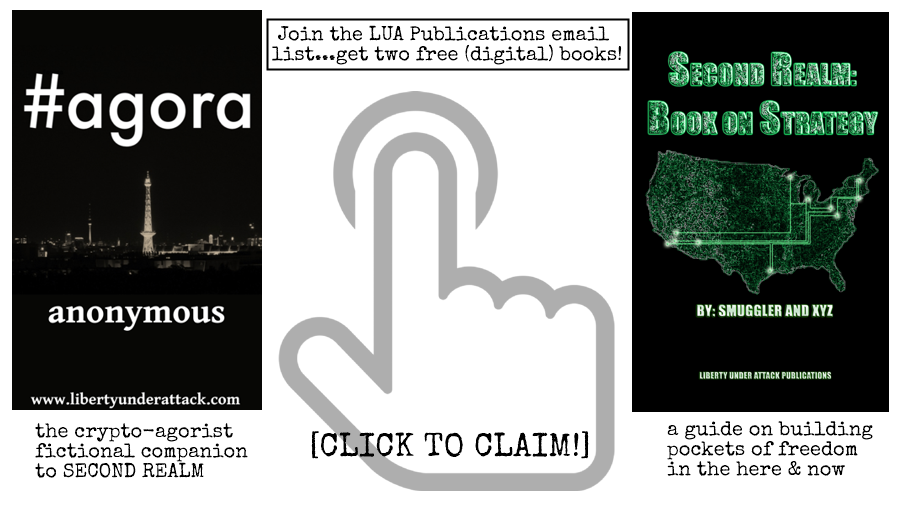The Righteous Persecution of Drug Consumers and Other Heretics
Editor’s Note: The following is Chapter 12, “The Righteous Persecution of Drug Consumers and Other Heretics,” from George H. Smith’s book, “Atheism, Ayn Rand, and Other Heresies. It seems the current rulers are going to ramp back up the War on Drugs, so I figured I’d let Mr. Smith have his two cents, once again. Herein, he compares the current drug inquisitors to former inquisitors of the past. I guess the saying is true: there really is nothing new under the sun, especially when it comes to the State.
In summation, I would highly recommend this book; George is a great writer, historian, and philosopher. You can get it by clicking cover image below [Amazon affiliate].
Any errors in this transcription are solely mine. -Shane
[BEGIN SMITH]
“Righteous persecution” — that is how St. Augustine (354-430) described the punishment of Christian heretics. Augustine, called by a biographer “the first theorist of the Inquisition,” was not the first to defend the persecution of dissenting minorities. But previous defenders did not presume to punish dissenters for their own good. It was left to the peculiar genius of Augustine to recommend persecution as fulfillment of the maxim, “Love thy neighbor.”
Augustine’s doctrine of righteous persecution became a rationale for the medieval Inquisition and, later, the Spanish Inquisition. The American government is currently engaged in its own Inquisition: the “war on drugs” — or, more precisely, the war on consumers of illegal drugs.
The modern drug inquisitor is another Augustine dressed in secular garb. Whereas Augustine sought to save the religious heretic from a literal hell, the modern inquisitor seeks to “save” the social heretic (the drug consumer) from the metaphorical “hell” of his “addiction.” And just as Augustine’s theory wreaked havoc in previous centuries — so the same theory, when secularized and applied to the “war on drugs,” has created social turmoil and devastated hundreds of thousands of lives through imprisonment.
For over two decades, while Augustine was a bishop in northern Africa, he campaigned against a large group of Christian schismatics known as Donatists. Initially, Augustine favored voluntary conversion, but he later called for righteous persecution “inflamed by love” — “a love which seeks to heal” heretics and deliver them from “the darkness of error.”
Heretics, Augustine believed, imperil their “spiritual health”; they are destined to suffer the torments of hell. Thus, those who truly “love their neighbor” will recognize their “duty” to compel those “wandering sheep.” Righteous persecutors are like physicians who try to help a “raving madman,” for heretics “commit murder on their own persons.” When motivated by love, persecutors cannot do evil: “Love and you cannot but do well.”
In true Augustinian fashion, the modern drug inquisitor seeks to “heal” wayward drug users who “commit murder on their own persons.” Indeed, Augustine’s defense of righteous persecution anticipates virtually every argument used by drug inquisitors.
For example, our modern inquisitors claim that drug consumers are slaves to evil habits and so require coercive intervention for their own good. Augustine, too, warned against the “fetters” of sinful habits which have “the strength of iron chains.” These evil habits (“a disease of the mind”) become a “necessity,” forming a “chain,” which holds the victim “in the duress of servitude.”
Sinful humans, according to Augustine, cannot overcome their evil habits without divine intervention — the grace of God. Drug consumers, according to modern inquisitors, cannot overcome their evil habits without secular intervention — the grace of government.
Can coercion change a person’s beliefs and compel him to do good? No, said Augustine, but coercion can provide an incentive to avoid evil: “The fear of punishment…keeps the evil desire from escaping beyond the bounds of thought.” Persecution can break the bonds of habit and induce the heretic “to change his purpose for the better.”
Drug inquisitors offer the same justification for their righteous persecution of drug consumers. But what about those consumers who don’t change their habits even after they are punished? Augustine faced the same problem with heretics who had stubbornly refused to embrace Catholicism. His response has been echoed by a long line of drug inquisitors: “Is the art of healing, therefore, to be abandoned, because the malady of some is incurable?”
Drug inquisitors love to trot out former users who, having been saved from an earthly “hell,” now give thanks to drug laws and their enforcers. Augustine used the same tactic. Converted heretics — “conquests of the Lord” — told how they had wished to return to the Catholic Church but, enslaved by habit, were unable to do so. “Having recovered their right minds,” these reformed heretics expressed thanks that “these most wholesome laws were brought to bear against them, with as much fervency as in their madness they detested them.” Converted heretics were grateful to their persecutors — their “truest friends” — for having delivered them “from that fatal and eternal destruction.”
(Augustine acknowledged that some heretics refused to submit to their persecutors and committed suicide instead. Modern reporters would probably call these “heresy-related deaths.”)
Through the Middle Ages, it was often difficult for heretics to spread their poison, because book production was confined to monasteries and universities. This changed in the mid-fifteenth century, however, with the invention of printing. German printers carried their art throughout western Europe — to Italy, France, Spain, the Low Countries, Switzerland, and elsewhere.
During the sixteenth century, more and more people became hooked on literacy. These reading addicts, unable to control their habit, demanded more books, a greater variety of books, and books of better quality. Their insatiable demand created a huge market for heretical books, and unscrupulous book lords capitalized on this opportunity.
For example, Geneva, the center of Calvinism, produced some 300,000 volumes each year. These books, “full of abominable errors,” recognized no frontiers, as pushers carried their illicit merchandise along trade routes or smuggled them in ships.
Many rulers tried to win the war on heresy with a policy of zero-tolerance. Emperor Charles V established censorship in Germany, backed by the penalties of burning (for men), live burial (for women), tongue-piercing, and confiscation of property. England’s Henry VIII issued a list of banned books, and he forbade the importation of books printed abroad in the English language. Frances I prohibited all printing in France. Phillip II decreed the death penalty for importing books into Spain.
Book lords often faced the death penalty. In 1524, the bookseller Herrgott was beheaded in Leipzig, and, three years later, an Anabaptist printer was burned at Nuremberg.
In 1625, the Englishman George Withers attacked booksellers as “the Devil’s seedsmen” and as “pernicious superfluities.” Booksellers, Withers charged, are concerned only with profit; in pushing their wares, they have no regard “either to the glory of God or the public advantage.” Another Englishman complained of “pamphlet-mongers” who “impoison” their pens “for a little mercenary gain.” Even John Milton, a critic of prepublication licensing, warned that books “are as lively, and as vigorously productive, as those fabulous dragon’s teeth; and being sown up and down, may chance to spring up armed men.”
Despite their best efforts, governments found it difficult to curb the growing number of book addicts and their dealers. Indeed, authorities could not even keep proscribed books out of prisons. While French Calvinists (Huguenots) languished in seventeenth-century prisons, they still managed to satisfy their habits with smuggled reading material.
If large, established printers violated antibook laws, they were easily shut down. This was not true of small printers, however, who could publish in homes, dismantle their equipment, and move to other towns.
For example, in sixteenth-century England, a group of Puritans published the notorious “Marprelate tracts.” The first of these irreverent attacks on the Established Church was printed near Kingston in the home of Mrs. Crane. Then, with authorities at their heels, the printers moved their press to the north of England and the home of Richard Knightly. (Meanwhile, a pusher disguised as a cobbler smuggled the illicit tracts to London.)
The renegade printers moved their press several more times, until they were finally apprehended at Warrington. There, while the press was being unloaded from a cart, a piece of type fell to the ground. A conscientious townswoman became suspicious and reported the incident to authorities. This brought an end to the activities of the Marprelate book lords.
The underground book-market had a serious drawback. Small printers, in search of quick profits, often did hasty, careless work. This caused many books to become adulterated with errors. For instance, in 1541 Martin Luther complained that reprints of his books were done by printers who “look only to their own greed.” Some of his books had become “so garbled that in many places I have not recognized my own work.”
Then of course, there were the children. In 1562, Paris authorities were asked to prosecute a butcher who had given heretical alphabet books to about two hundred children. Centuries later, during Thomas Paine’s trial for sedition in England, the prosecutor claimed that candy had been wrapped in pages from Rights of Man and then sold to kids. The government, duly alarmed, prohibited the dangerous book.
Righteous persecutors — whether of heretics, printers, book addicts, or drug addicts — are cut from the same cloth. Modern drug inquisitors are nothing more than updated versions of previous zealots who, inflamed with an intolerant self-righteousness, presumed to tell others how to live.
Today, the United States government has target millions of citizens for righteous persecution. Thousands of nonviolent Americans are imprisoned each year, civil and economic liberties are fast disappearing, and foreign wars loom on the horizon. The much-heralded “war on drugs” is a war on individual rights — one of the greatest threats to liberty ever experienced by Americans.




Pingback: | The Righteous Persecution of Drug Consumers and Other Heretics (George H. Smith)